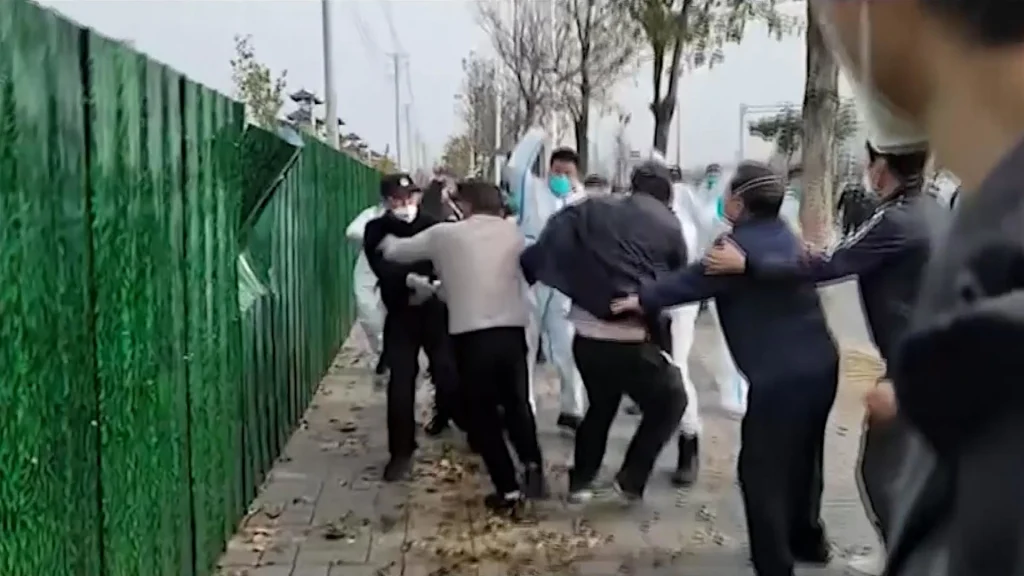‘We need democracy, rule of law, and freedom of expression!’ chant students at Tsinghua University in Beijing, Chinese president Xi Jinping’s alma mater; call for an end to lockdowns and mass testing gathers steam on social media
Protests in China against the government’s harsh COVID-19 lockdown measures continued to intensify over the weekend, spreading to dozens of university campuses around the country in an unprecedented challenge to the Communist Party on a scale unseen in decades.
The protests against lockdowns were triggered by widespread anger at the death of at least 10 people in a fire in an apartment in the western city of Urumqi, with delays in extinguishing the blaze widely seen by the public as a result of lockdown policies.
The protests have coincided with a record outbreak of cases across China in recent days, which have brought fresh lockdowns. The National Health Commission on Sunday reported more than 39,500 cases, the highest since the pandemic began.
Late on Saturday night, crowds gathered in Shanghai, China’s largest city and financial capital, on Urumqi Road—named after the city in Xinjiang—to mourn the victims of the fire. Videos on social media showed protesters calling for an end to lockdowns and mass testing. Some raised slogans against Mr. Xi and the ruling Communist Party. Several hundred people gathered in Beijing on Sunday night for a rare protest. Some laid out candles to mourn those in Urumqi, while others chanted, “We don’t want COVID tests, we want freedom!” A large police presence was deployed around the protest that took place near the Liangma river in the heart of the capital.
Protests this weekend spread to more than 50 Chinese college campuses, according to a list shared online and dozens of protest videos shared on social media. In the elite Tsinghua University in the heart of the Chinese capital—Mr. Xi’s alma mater—students gathered on Sunday, chanting: “We need democracy, rule of law, and freedom of expression!”
“We haven’t seen scenes like this since 1989,” a veteran Chinese journalist told The Hindu, referring to the Tiananmen Square protests.
This weekend, thousands of students gathered across the country, from Sichuan University in the West to Nanjing Communications University in the east. While China local-level protests against issues ranging from land grabs to environmental pollution are not uncommon, what is now unprecedented is a national-level protest on the same issue, and carried out in direct opposition to a central government policy. Only last month, Mr. Xi defended the zero-COVID policy at the Party Congress that marked the start of his third term.
If the scenes from around campuses were certainly unprecedented, less clear is the road ahead. On Sunday, the Communist Party’s official People’s Daily declared the government would continue to firmly adhere to the zero-COVID policy, even as anger grows at the economic and social costs, and questions mount as to how the rest of the world has left China behind in emerging from the pandemic.
Chinese health experts have told State media the country could not afford to open up given the vast elderly population and the stress on its medical system that could face a collapse. China could face millions of deaths with only 40% of the above-80 population having completed three doses of Chinese vaccines, needed to prevent hospitalisation and death. There has not been any recent attempt, however, to revive the booster campaign that has taken backseat with healthcare resources devoted to lockdowns and testing.
Residents of Urumqi in China took to the streets in a rare protest against prolonged COVID curbs, according to footage seen on social media https://t.co/tHXkz5DsMX pic.twitter.com/DCijWielQ9
— Reuters (@Reuters) November 26, 2022
Yet at the same time, millions of Chinese have struggled under the continuing weight of the zero-COVID regime. Continuing lockdowns have decimated livelihoods and the economy. University students have been particularly badly affected, spending months either in online learning or confined to their dormitories, and facing on graduation arguably the worst job prospects in China’s reform era . “Our youth has been stolen,” said one comment online.
Thousands of students expressed their sentiment by carrying blank white sheets of paper as they gathered in their campuses, or posting blank images online to show solidarity with the protesters.
In Nanjing, a university official with a megaphone told the protesters they “would pay one day for what they have done” and reminded them that the COVID-19 measures were “state policy”, according to a video.
One of the students responded, “the state will also have to pay too”.


